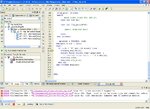Arrowspace
Banned

Code VHDL - [expand]
ERROR:Xst:827 - "H:/carry skip adder/carryskipadder/carryskipadder.vhd" line 41: Signal s<0> cannot be synthesized, bad synchronous description. The description style you are using to describe a synchronous element (register, memory, etc.) is not supported in the current software release.
Can anyone tell me what is problem in code
Thanks
Last edited by a moderator:
